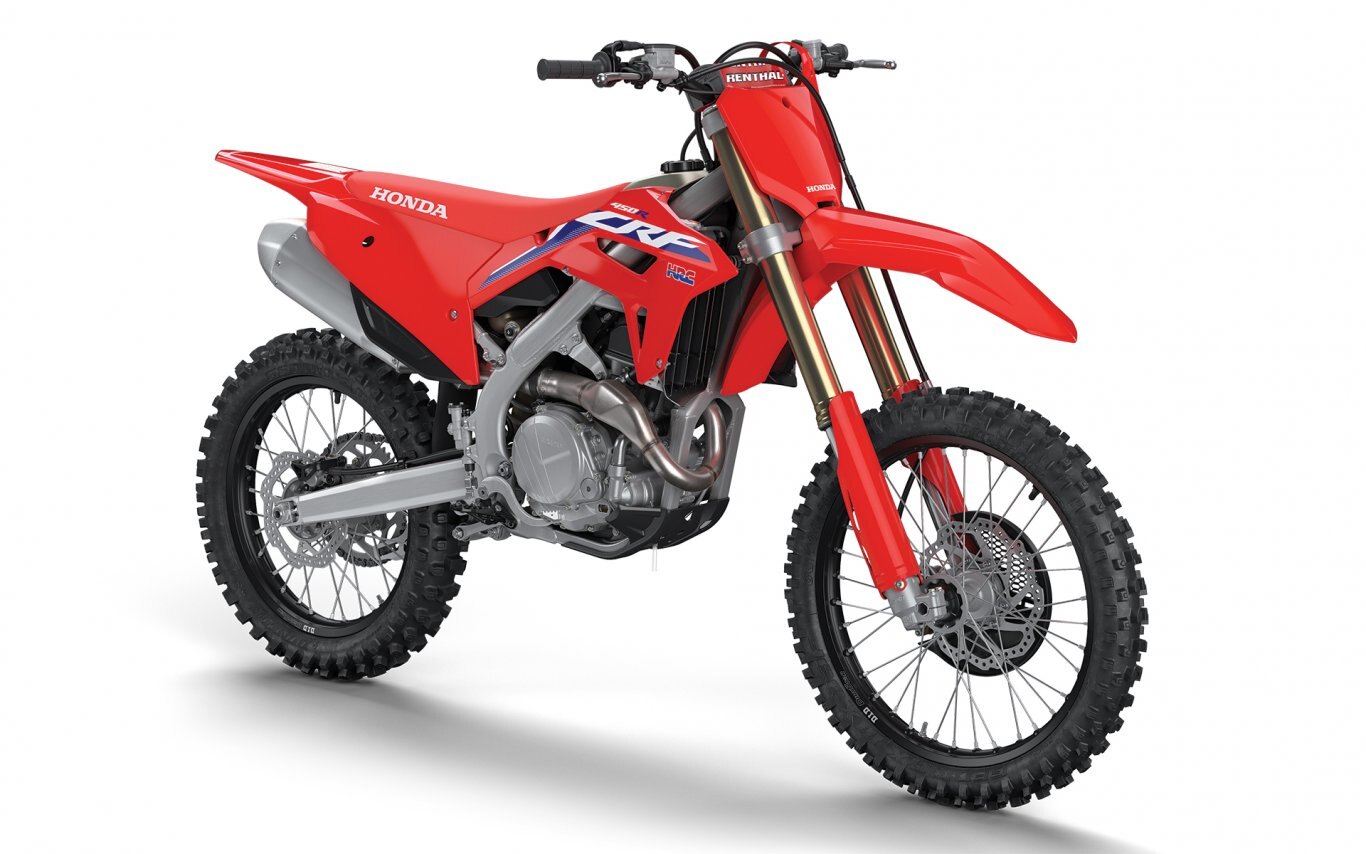
2021 Honda CRF450R
Contact for Price
Call 905.522.0503
Item Details
ID: 16795215
Make: Honda
Type: New
Make: Honda
Type: New
Year: 2021
Model: CRF450R
Model: CRF450R
Brakes: Front: 260 mm disc with dual-piston caliper Rear: 240 mm disc
Tires : Front: 80/100-21 Rear: 120/80-19
Warranty: No warrranty
Wheelbase: 1,481 mm (58.3 in.)
Curb Weight: 111 kg (244 lb.) including required fluids and full tank of gas—ready to ride
Engine Type: Liquid-cooled single-cylinder 4-stroke
Final Drive: #520 sealed chain; 13T/49T
Seat Height: 965 mm (38 in.)
Valve Train: Unicam, 4 valves
Transmission: Close-ratio, five speed
Bore & Stroke: 96 mm x 62.1 mm
Fuel Capacity: 6.3 litres
Fuel Delivery: PGM-FI electronic fuel injection with 46 mm throttle body
Rear Suspension: Pro-Link® Showa single shock with adjustable spring preload, rebound damping adjustability, and compression damping adjustment separated into low-speed and high-speed; 315 mm (12.4 inches) travel
Front Suspension: Showa 49 mm telescopic inverted coil spring with rebound and compression damping adjustability. 310 mm (12.2 in ) travel.
Ground Clearance: 336 mm (13.2 in.)
Compression Ratio: 13.5:1
Item Description
|
Key Features
|
|
The Best Get Better Re-imagined, re-engineered, re-energized. Making the best 450 even better required major changes to just about every component, with the result being a bike that’s lighter, more powerful, better handling, and even easier to ride fast. |
|
Razor-Sharp Cornering Under the development theme of Razor-Sharp Cornering, the CRF450R is 3 lb. lighter thanks mainly to a revised frame and subframe. The new frame and swingarm’s rigidity balance, combined with tighter chassis geometry and suspension changes, all help to create optimal cornering performance. And that leads to faster lap times. |
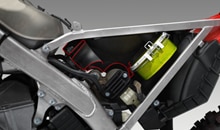 A significant increase in peak power above 5,000 RPM is accompanied by stronger low-RPM torque feel, thanks to a larger airbox feeding a new 46 mm throttle body that improves intake efficiency and makes active use of latent vaporization in the inlet ports. The injector angle has been radically changed — to 60 degrees from 30 degrees — spraying fuel all the way back to the butterfly valve, which improves intake efficiency, throttle feel, and cooling of the charge. |
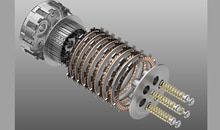 Hydraulic Clutch Hydraulic ClutchBig power requires a strong clutch, and for 2021 this bike delivers with a smooth-operating hydraulic clutch. Ditching the cable improves consistency, control and feel at the lever (lever pull is 10% lighter). Clutch capacity has been increased by 27% with an extra plate and spring to maximize power transfer and durability. To top it off, clutch slip has been reduced by 85% at peak power. |
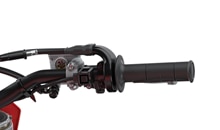 Electric Start Electric StartKickstarting? Maybe if you’re riding in the vintage class, but not here. By ditching the kickstarter entirely, our engineers were able to make a light bike even lighter. Electric starters and lithium-ion batteries are so light now and so good that putting them on a bike like this is a win/win combination. And winning is what a CRF450R-series bike is all about. |
|
Honda Selectable Torque Control (HSTC) Honda Selectable Torque Control (HSTC) works to minimize rear wheel spin (thus wasted forward drive) and maximize traction. It doesn’t use a wheel-speed sensor, and, importantly, maintains feel at the throttle while managing power — ignition timing and the PGM-FI system are adjusted when the rate of change of rpm goes over a set amount. With three settings plus off to choose from, you can have your bike dialed no matter how much traction there is. |
|
HRC Launch Control We’re talking about a special ECU program here: push the button to select the mode, hold the throttle open, release the clutch, and the bike will do the rest, launching you into the first turn with a big advantage. |
|
Engine Mode Select Button This simple handlebar-mounted button lets you dial in engine power delivery character with a push of your thumb. Choose between Standard, Smooth and Aggressive, depending on track conditions. |
|
Engine Mode Select Button This simple handlebar-mounted button lets you dial in engine power delivery character with a push of your thumb. Choose between Standard, Smooth and Aggressive, depending on track conditions. |
| Chassis & Suspension |
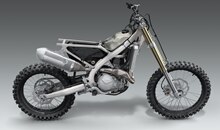 With direct input from the HRC race team, the twin-spar aluminium frame has been thoroughly revised for 2021 to reduce weight and to elevate every aspect of its cornering ability. Thanks to narrower main spars and a redesigned subframe, it is significantly lighter than it's predecessor. Chassis dynamics are also new — while torsional rigidity is maintained, lateral rigidity has been reduced by 20% to increase corner speed, traction, and steering accuracy. The aluminium swingarm has a new rigidity balance tuned to match the frame, with narrower arms and pivot point, plus a revised Pro-Link ratio. |
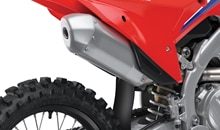 Oval Exhaust Ports Oval Exhaust PortsBig changes to the 450 cc Unicam engine’s exhaust ports. As with the CBR1000RR-R Fireblade, their exit is oval rather than round in shape for improved efficiency, and the twin exhaust design of the previous model has been replaced by a single downpipe and muffler, saving a full 1.24 kg (2.7 lb.). The downpipe also tucks in 74 mm closer to the centre line, improving rider ergonomics. |
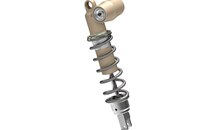 Race-Proven Suspension Race-Proven SuspensionFully adjustable, the 49 mm Showa USD coil-spring fork is a version of the Showa 'factory' fork supplied to race teams in the Japanese championship. For smoother cornering performance, the fork has been revalved, stroke lengthened by 5 mm, and the axle clamps’ rigidity increased. The Showa rear shock’s main piston valve has been enlarged for faster response and improved bump absorption; its spring also uses the world’s lightest steel, saving 200 grams. |
| Additional Features |
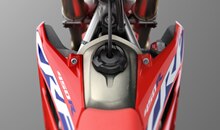 Titanium Fuel Tank Titanium Fuel TankGrams and performance count, and to keep the weight down, the fuel tank is constructed of titanium. Light and strong, it’s also thinner than our previous plastic unit, freeing up more space and helping to centralize fuel mass. |
|
Lighter Seat The seat is now shorter, lighter, and 10 mm lower at the rear to aid freedom of movement. It’s also much easier to remove and install. Overall, the bike is slimmer by 70 mm to make it feel and act even more nimble. |
